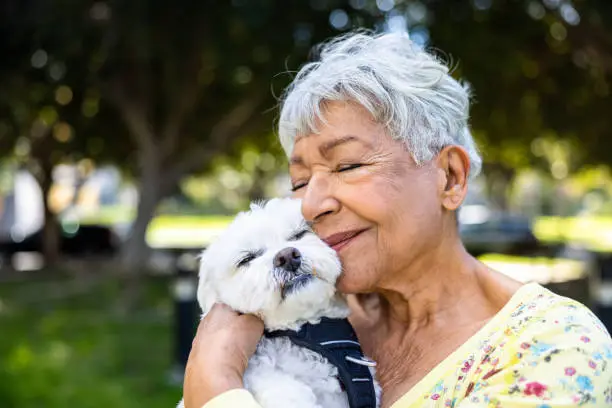If you’ve noticed your elderly loved one seems down and lonely lately, a pet might just be the perfect companion to lift the spirit. Everybody knows how pets can bring joy and a sense of connection, especially for a senior who may be dealing with isolation or losing a sense of purpose. However, choosing the right pet—one that doesn’t need demanding care yet is affectionate—is a must.
Continue reading as we take a look at some of the best pets for the elderly that can brighten everyday life.
The Benefits of Pets For Seniors
Emotional Health Benefits
According to experts, there’s a reason why people love to see those pet videos online. It’s due to the lower stress hormone level and increased ‘feel-good’ hormone when interacting with them. As people become older, it’s easy to be stressed about being unable to do something once cherished or feel lonely. Luckily, pets for the elderly have a remarkable way of boosting emotional well-being and offering unconditional love.
Physical Health Benefits
Beyond emotional, one of the standout benefits is how pets for the elderly, like dogs, naturally encourage walking—and with walking comes gentle yet effective exercise. Even a short 15-minute walk can improve blood circulation, maintain joint flexibility, and prevent chronic conditions like high blood pressure. The fresh air and change of scenery aren’t so bad themselves. What about birds or fish? Well, they still need to be fed and entertained every day, meaning they encourage seniors to remain active at home.
Cognitive Benefits
Pets for the elderly don’t just keep seniors active and emotionally grounded—they can also sharpen the mind. For seniors with cognitive decline like dementia or Alzheimer’s or at risk of having it, the presence of a pet can stimulate mental engagement, as caring for it requires your loved one to engage the cognitive part of the brain. Reacting to the pet’s behavior also prompts your loved one to be present while talking, which keeps the verbal skills sharp.
Factors To Consider When Choosing a Pet for an Elderly Person
First off, the pet’s energy should align with the seniors. Otherwise, it may overwhelm or, worse, take a toll on your loved one’s health. For example, a high-energy dog may not be suitable if your loved one has mobility issues, while a laid-back cat or a fish may be a better fit. The needs of the pet should also match. A pet requiring special treatment and attention can be a burden if your beloved senior prefers some peace and quiet.
Size is also a big deal, especially if space is an issue. So, think about your parents’ living situation—does the home have a yard, or do your parents live in a small apartment? Still, our tip is to aim for something more manageable, like a small breed or a tanked fish, because a pet that’s too large could also pose a tripping hazard or be too big for your aging loved one with diminishing ability. When the needs between two parties don’t match, one of them may suffer.
One that may be overlooked is also the pet’s age. Sure, a young puppy or kitten looks very adorable. But, these young pets may outlive the owner, raising concerns about who’ll care for them later. On the other hand, adopting an older pet, say a 7-year-old dog, ensures a balance of companionship with no long-term commitment.

Best Pets For the Elderly
1) Dogs
Dogs are known for their loyalty, loving nature, and the ability to adapt to different lifestyles. However, not all dogs are suitable for elderly owners. So, if you’re thinking about getting your senior a dog, here are the breeds:
- French Bulldog: Compact and low-maintenance, they’re happy with a leisurely stroll and plenty of rest.
- Cavalier King Charles Spaniel: Gentle and calm, this breed loves lap time and doesn’t need intense exercise.
- Pug: Small, low-energy, and affectionate pugs are content with short walks and lots of cuddles.
Pros
- Companionship: Dogs offer unwavering loyalty and emotional support, reducing loneliness.
- Safety: Some breeds can alert owners to visitors or unusual sounds, adding a sense of security.
- Routine: Feeding and walking a dog provides structure, which can boost mental well-being. The daily walks (even short ones) can also keep your loved one active.
Cons
- Physical Demands: Even calm breeds need some walking or play, which may be challenging or even dangerous if your loved one has limited mobility.
- Maintenance and Cost: Grooming, feeding, and vet visits can add up in effort, both physical and cost.
2) Cats
If your loved one is a laid-back type of person who prefers a slower pace, cats offer the perfect balance between companionship and simplicity. The best part of all is their low-key nature, perfect for companionship without the hustle of a high-energy pet. Most cats have these traits, yet the best ones for the elderly are:
- Ragdoll: Known for their gentle, floppy demeanor, they’re affectionate and easygoing.
- Persian: Quiet and docile; they love lounging and don’t demand much activity.
- Siamese: Social and chatty, they’re great for seniors who enjoy a bit of interaction.
Pros
- Low Maintenance: Cats self-groom and don’t need walks, making them easy to care for.
- Companionship: They offer a quiet, steady presence—perfect for cuddling or just sharing space.
- Space-Friendly: Ideal for apartments or small homes since they don’t need much room to roam.
- Stress Relief: Petting a purring cat can soothe anxiety in older adults.
Cons
- Litter Box Duty: Cleaning can be tough for seniors with mobility issues.
- Allergies: Fur or dander might trigger reactions, though hypoallergenic breeds like the Siberian could help.
- Health Costs: Older cats, especially, may need vet care for age-related issues.
- Independence: Some cats might not be as openly affectionate, which could disappoint if your loved one craves connection.
3) Birds
 The unique option of pets for the elderly that bring a splash of color and sound into the home of your loved one. Apart from being delightful, birds are simpler in maintenance and perfect for seniors with mobility issues who spend a lot of time at home. Below are the types that you can pick:
The unique option of pets for the elderly that bring a splash of color and sound into the home of your loved one. Apart from being delightful, birds are simpler in maintenance and perfect for seniors with mobility issues who spend a lot of time at home. Below are the types that you can pick:
- Budgerigar (Parakeet): Small, social, and cheerful, a budgie can learn to chirp tunes or mimic words with patience.
- Finch (e.g., Zebra Finch): Easy to care for and content in small groups; they’re ideal for observation rather than interaction.
- Canary: Quiet and low-maintenance, their beautiful songs appeal to seniors who prefer a peaceful pet.
Pros
- Entertainment: Their chirps, songs, or even mimicry (think parrots) can brighten a quiet home.
- Low Physical Demand: No walking or heavy lifting—just a cage to maintain, which suits limited mobility.
- Companionship: Birds like budgies or cockatiels can bond with owners, offering interaction without overwhelming care.
- Space-Saving: A small cage fits easily into any living space, from apartments to assisted living rooms.
Cons
- Noise: Some birds, like parrots, can get loud, which might be disturbing if living in an apartment.
- Mess: Seed husks and feathers mean regular cage cleaning, which could be tricky for shaky hands.
- Fragility: Birds require gentle handling and specific care (temperature, diet), which might be a learning curve.
- Limited Physical Affection: Unlike dogs or cats, birds don’t cuddle, potentially leaving some seniors wanting more tactile connection.

4) Fish
Not all people enjoy petting or having a physical interaction with a pet. Some just love to observe and find peace in the quiet beauty of nature. Fish are a wonderful choice for seniors who prefer a hands-off companion that still brings life and calm to their space.
Pros
- Relaxation: Watching fish swim has a proven calming effect, reducing stress and even lowering blood pressure.
- Low Maintenance and No Physical Demands: Feeding them once or twice a day and occasionally cleaning the tank are the main tasks that are manageable for most seniors. Besides, there’s no need to walk, groom, or handle them.
- Visual Appeal: A small aquarium adds color and tranquility to any room, enhancing the environment without noise or mess.
Cons
- Limited Interaction: Fish don’t offer affection or companionship, which might leave some seniors feeling disconnected.
- Tank Upkeep: Cleaning the aquarium, though infrequent, can be tricky for those with arthritis or poor dexterity.
- Initial Setup: Setting up a tank (filters, water conditions) requires effort or help, which might be a hurdle.
Tips for Seniors Caring for a Pet
- Choose the Right Pet: Match the pet’s energy and care needs to the physical abilities—opt for low-maintenance options like a cat, fish, or an older dog if mobility is limited.
- Simplify Routines: Use automatic feeders for fish or cats or set reminders for feeding and walking to keep tasks consistent and stress-free.
- Stay Safe: Pick smaller pets to avoid tripping risks, and use a lightweight leash or harness for dogs to reduce strain during walks.
- Ask for Help: Enlist family, friends, or neighbors for tasks like grooming, vet visits, or tank cleaning if bending or lifting gets tough.
- Keep Supplies Handy: Store pet food, litter, or cleaning items in easy-to-reach spots to minimize effort and prevent falls.
- Prioritize Health: Schedule regular vet checkups to catch issues early, keeping care costs and stress down over time.
- Enjoy the Bond: Spend quality time—whether it’s petting a cat, watching fish, or chatting with a bird—to maximize the emotional perks.
End Note
After you know the best pets for the elderly, encourage your loved one to follow our tips to make pet ownership a joy rather than a chore. However, if your parent loves the companionship of a pet but is no longer able to care for it, An Answered Prayer Home Care is indeed the answer you need. We offer pet care services to ensure their furry, feathered, or finned friend is well looked after, giving you peace of mind and the comfort they cherish.
Reach out to our team today.

